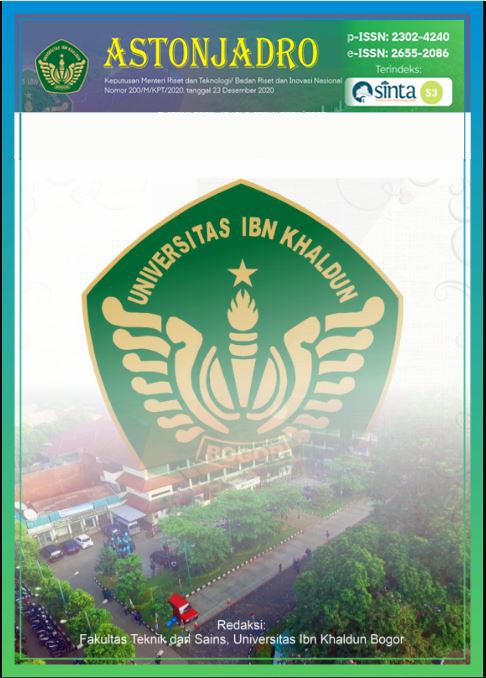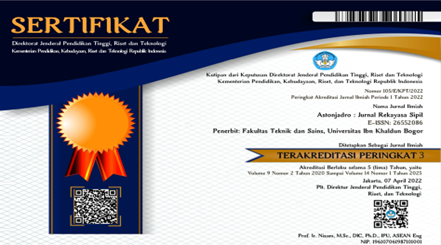Analysis of Cantilever Retaining Wall as Landslide Mitigation on a Tributary of Cisadane River Bogor City
DOI:
https://doi.org/10.32832/astonjadro.v12i3.7013Keywords:
disaster mitigation, retaining wall, cantilever, bored pile.Abstract
Bogor City has a high level of rainfall and is included in an area with a high potential for landslides. In March 2021, there was a landslide in a densely populated residential area at RT. 02/03 Cipaku Village, Bogor Selatan District. The landslide occurred on the slopes at the tributary of Cisadane River and adjacent to the nearest connecting bridge. The length of the landslide is 6 meters and as high as 7 meters from the water surface. Mitigation steps to prevent subsequent landslides are needed by constructing a retaining wall, so a cantilever-type retaining wall is chosen by considering the soil parameters and landslide conditions. The results of the analysis show that the stability of the retaining wall against shear (Fs) = 1.04 < SF = 1.5 and for stability against overturning (Fo) = 0.56 < SF = 1.5. Thus, the overall retaining wall is not able to withstand the load of the soil behind it. In terms of stability to the bearing capacity of the soil, the ultimate soil capacity (qs) = 94.149 kN/m2 > V = 243.535 kN/m2. Thus, the subgrade can withstand the load of the retaining wall. Therefore, to meet shear stability and overturning stability, the retaining wall is reinforced by using a bored pile foundation. The results of the foundation analysis showed that the allowable capacity (Qs) was obtained at 584.8 kN.
References
Aldo, A., & Susilo, A. J. (2019). Stabilitas Dinding Penahan Tanah Dengan Ground Anchor Dan Metode Pelaksanaannya Pada Kondisi in-Situ Dan Jenuh. JMTS: Jurnal Mitra Teknik Sipil, 2(4), 149. https://doi.org/10.24912/jmts.v2i4.6178
Asroni, A. (2010). Balok dan Pelat Beton Bertulang. Ali Asroni.
Aswanto, M. (2020). Perencanaan Penahan Tanah 15 M Dengan Dinding Kantilever Di Perimeter Swichyard Skyland Jayapura. Konstruksia, 11(1), 63. https://doi.org/10.24853/jk.11.1.63-72
Badan Standardisasi Nasional. (2019). SNI 2847: 2019 Persyaratan Beton Struktural untuk Bangunan Gedung dan Penjelasan (Issue 8). Badan Standardisasi Nasional.
Fadhilah, L., & Sudarno, S. (2017). Perencanaan Dinding Penahan Tanah untuk Perbaikan Longsor di Ruas Jalan Balerejo Kalegen. Review in Civil Engineering, 1(1), 25–28. https://doi.org/10.31002/rice.v1i1.539
Fadli, M., Hariati, F., Chayati, N., & Taqwa, F. M. L. (2021). Perlindungan Tebing Sungai Ciliwung dengan Dinding Kantilever Ruas Kampung Legok Nyenang, Kabupaten Bogor. Jurnal Komposit, 5(1), 17–23.
Hakam, A., & Mulya, R. P. (2011). Studi Stabilitas Dinding Penahan Tanah Kantilever Pada Ruas Jalan Silaing Padang - Bukittinggi KM 64+500. Jurnal Rekayasa Sipil, 7(1), 57–74. https://doi.org/https://doi.org/10.25077/jrs.7.1.57-74.2011
Hardiyatmo, H. C. (1993). Mekanika Tanah I. Hary Christady Hardiyatmo.
Hardiyatmo, H. C. (2002). Teknik Pondasi 1 Edisi Kedua. In Gramedia Pustaka Utama.
Hardiyatmo, H. C. (2008). Teknik Fondasi 2.
Nur, O. F., & Hakam, A. (2010). Analisa Stabilitas Dinding Penahan Tanah (Retaining Wall) Akibat Beban Dinamis Dengan Simulasi Numerik. Jurnal Rekayasa Sipil (JRS-Unand), 6(2), 41. https://doi.org/10.25077/jrs.6.2.41-54.2010
Nur, R. A., Susilo, G. E., & Sumiharni, S. (2017). Perencanaan Dinding Penahan Tanah pada Sungai Way Hui Kabupaten Lampung Selatan. JSRDD: Jurnal Rekayasa Sipil Dan Desain, 5(2), 1–12. http://journal.eng.unila.ac.id/index.php/jrsdd/article/view/665
Pane, E. P., Muhamad, I. N., & Wiadnya, DGR. (2020). Analisis Dinding Penahan Tanah Dengan Pondasi Tiang Bor Studi Kasus Tower PLN SUTT 150KV No.71 Di Jalan Gatot Subroto Barat Denpasar. Prosiding Seminar Nasional Perikanan Dan Kelautan VII, 12(November), 126–130.
Pustlitbang PUPR. (2017). Buku Peta Gempa 2017.
Sadat, B. A., Isya, M., & Rani, H. A. (2018). Analisis Efisiensi Dinding Penahan Tanah Type Kantilever di Kecamatan Babahrot Kabupaten Aceh Barat Daya. Jurnal Arsip Rekayasa Sipil Dan Perencanaan, 1(1), 18–26. https://doi.org/10.24815/jarsp.v1i1.10331
Supriyanto, M., Suhudi, S., & Sulistyani, K. F. (2017). Perencanaan Perkuatan Dinding Penahan pada Bantaran Sungai Konto di Kecamatan Pujon Kabupaten Malang. EUREKA: Jurnal Penelitian Teknik Sipil Dan Teknik Kimia, 1(2), 1–14. https://publikasi.unitri.ac.id/index.php/teknik/article/view/867
Soewandy, I. (2012). Studi Efisiensi Lebar Alas Dinding Penahan Tanah Tipe Kantilever Pada Perumahan The Mutiara. Universitas Hasanuddin.
Downloads
Published
How to Cite
Issue
Section
License
Copyright (c) 2023 ASTONJADRO

This work is licensed under a Creative Commons Attribution-ShareAlike 4.0 International License.
Paper submitted to ASTONJADRO is the sole property of the Astonjadro Journal. Unless the author withdraws the paper because he does not want to be published in this journal. The publication rights are in the journal Astonjadro.ASTONJADRO
LICENSE
This work is licensed under a Creative Commons Attribution-ShareAlike 4.0 International License.
Based on a work at http://ejournal.uika-bogor.ac.id/index.php/ASTONJADRO













